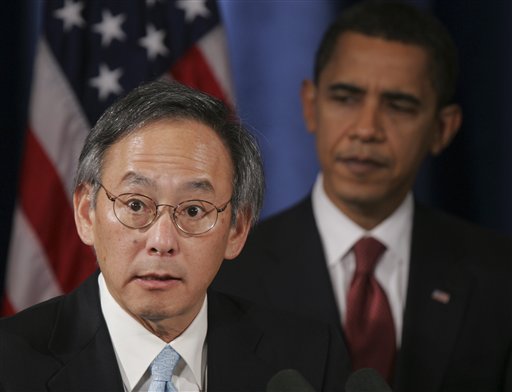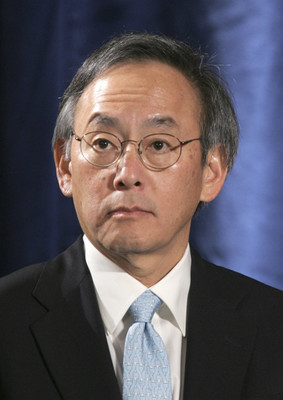Energy pick signed report
WASHINGTON -- Steven Chu, the federal laboratory director selected this week to lead the Department of Energy, signed on to a nuclear energy report whose recommendations included licensing for a nuclear waste repository at Yucca Mountain.
Chu's signature on the August report, alongside those of nine other high-ranking federal science managers, is suggesting to some people that there might be a gap between his thinking on the controversial Nevada project and that of his expected soon-to-be boss, President-elect Barack Obama.
While some Nevada lawmakers have been quick to characterize Chu as no friend of Yucca Mountain, the report indicates there might be more nuance to his position, even if in the end he carries out an Obama campaign pledge to end the project.
"This is pretty disturbing, and he did affix his name to that report," said Kevin Kamps, radioactive waste watchdog for the Beyond Nuclear energy advocacy group that opposes the Yucca repository.
"If you look at what is in this report and what Obama said on the campaign trail, especially in Nevada, there is a difference," Kamps said. "My hope is that Barack Obama will be giving direction to his energy secretary."
When he ran for president, Obama was critical of the Energy Department's effort to build a nuclear waste complex at the Yucca site, about 100 miles northwest of Las Vegas, and indicated he would end the program and divert funding to investigate other options for managing highly radioactive spent nuclear fuel.
At roughly the same time, the directors of 10 national laboratories including Chu as head of the Lawrence Berkeley National Laboratory in California were forming a position paper on nuclear power that was forwarded to Energy Secretary Samuel Bodman near the end of the summer.
In the eight-page report, the directors said they "strongly believe that nuclear energy must play a significant and growing role in our nation's -- and the world's -- energy portfolio." It recommended getting maximum use of the current fleet of nuclear plants while immediately deploying advanced light-water reactors to meet growing energy needs.
On nuclear waste, the directors called for a suite of actions, including interim storage of waste either on-site or away from power plants, licensing of the Yucca repository as a long-term measure, and federal funding for development of waste reprocessing and other forward-looking technologies.
"Confidence regarding the disposal of waste is needed before the (federal Nuclear Regulatory Commission) will grant a license for a new plant and before private investors will accept the financial risk of ordering new nuclear plants," the directors said.
"In the short term this confidence can be achieved by continuing the licensing of a geologic repository at Yucca Mountain and enabling the continued interim storage of used nuclear fuel in dry casks and fuel pools," the report said.
The issue paper is circulating among energy lobbyists and interest groups looking for clues as to how Chu, a 1997 Nobel Prize winner in physics, might manage nuclear issues as energy secretary.
Whatever Chu signed over the summer, Sen. Harry Reid, D-Nev., remains confident the energy secretary-designate will work to end the repository program as part of the Obama team, Reid spokesman Jon Summers said.
"He spoke with Chu about Yucca Mountain and got a commitment from him the dump won't become a reality," Summers said.
"That, combined with the commitment that he got from President-elect Obama, and that combined with his position in the Senate (as majority leader) ... Yucca's dead," Summers said.
Chu's main expertise, touted by Obama when he introduced his pick Monday, has been in research and development of alternative energy technologies and strategies to combat climate change.
Chu has advocated nuclear power as a clean energy source, but like many others has expressed concerns about how its deadly waste can be managed.
The nominee-designate has spoken approvingly of spent fuel reprocessing but has said little specifically about the Yucca Mountain Project, where the Department of Energy wants to store more than 77,000 tons of commercial spent fuel and government-generated nuclear waste in a warren of tunnels 1,000 feet below the mountain's surface.
An aide for the Obama transition office said Tuesday night that ultimately the incoming president will be calling the shots on Yucca Mountain.
"The president-elect will rely on Dr. Chu for advice, but like all members of his Cabinet, he will be charged with implementing the president-elect's policies," spokesman Nick Shapiro said. "And President-elect Obama has been clear throughout the campaign that Yucca Mountain should not and will not move forward."
Robert Budnitz, a staff scientist at the Lawrence Berkeley facility, advised Chu as part of a team from the national labs that shaped drafts of the position paper. The document was finalized by the lab directors themselves, he said.
"He signed it and he didn't sign it casually," Budnitz said of Chu. "He read every word of every paragraph of this thing, all eight pages."
Budnitz said there never appeared to be hesitation among the lab directors to endorse a geologic repository, whether it would be utilized for disposal of used fuel assemblies or as a destination for waste that would remain after fuel is recycled.
"I can say this without fear," Budnitz said, "All agreed that a geologic repository would be required. The idea that there would never be a geologic repository never occurred to them."
But Budnitz added he did not recall he and Chu ever having any discussions specifically about Yucca Mountain. Budnitz said he would be at a loss to describe the nominee's thinking about the project.
Several others involved with the report or familiar with it cautioned against reading into the document. The main author was Adam Cohen, deputy associate director for the Argonne National Laboratory.
Cohen said the report was worded to foster consensus among the directors.
He said, for instance, that the recommendation to continue licensing for Yucca Mountain was not so much an endorsement of the Nevada site as a desire for the Nuclear Regulatory Commission to identify and work out kinks in the license process "so you know it can be done and you have the right regulations."
The laboratory officials "are not here to pass judgment as to whether Yucca Mountain is good, bad or indifferent," Cohen said. "It is really science based. It never says outright we agree that Yucca Mountain is the best thing since sliced bread."
Contact Stephens Washington Bureau Chief Steve Tetreault at stetreault@stephensmedia.com or 202-783-1760.
ON THE WEB View PDF of the report


















